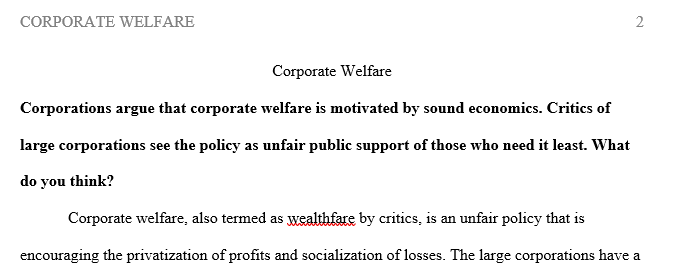Corporations argue that corporate welfare is motivated by sound economics.
WELFARE REFORM? WHAT ABOUT “WEALTHFARE” REFORM?
In 1992, a key part of the Clinton election platform was a promise to revamp welfare. By 1996, this was accomplished with the passage of the “Welfare Reform Act” that established a five-year maximum for welfare eligibility, replaced Aid For Dependent Children (AFDC) with Temporary Assistance to Needy Families (TANF), and ended welfare’s entitlement status and instead made it a grant-funded program administered by the individual states.
But little effort has been made to address corporate welfare, which critics call “wealthfare.” This concept refers to tax rebates or other types of tax forgiveness by which state and local government lure large companies to establish local factories. The problem, as they see it, is that tax rebates to a corporations lead to higher taxes for others or lower government revenues causing cutbacks in essential services. To date, cooperative efforts among states to stop the war of economic incentives to attract corporations have not been effective.
Critics of “wealthfare” have tried to reform this program in various ways. One possibility is to convince state and local governments to stop offering tax relief. But the promise of new jobs and eventual tax revenue, as local politicians see it, is too good to pass up. Another possibility would be having the federal government tax whatever benefit a state or local government provided. So far nothing like this has been done.
Discussion Questions:
1. Corporations argue that corporate welfare is motivated by sound economics. Critics of large corporations see the policy as unfair public support of those who need it least. What do you think?
2. Why do you think corporate welfare has continued at the same time that individual welfare programs experienced a dramatic revision?fx
Image preview for corporations argue that corporate welfare is motivated by sound economics.
APA
518 words

